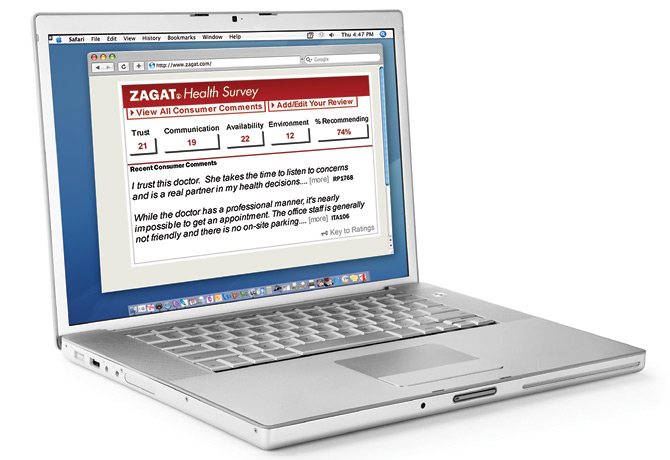
Keeping score
Word of mouth has always played a big role in medicine. A doctor's reputation is constantly being shaped by conversations among current and potential patients. Families and friends talk about a doctor's bedside manner, the helpfulness of a receptionist, how hard it is to get an appointment and how long you have to cool your heels in the waiting room. But a new kind of service may make the business of rating your doctor more like rating a restaurant—exactly like it, actually, thanks to the folks from Zagat, creators of the ubiquitous restaurant guides.
Zagat Survey has joined hands with the insurance company WellPoint to provide a rating system patients can use to grade their experience with their doctor. Millions of people have been introduced to the Zagat experience through the familiar burgundy-colored books filled with quote-heavy reviews that score restaurants on four criteria: food, dcor, service and cost. What makes the reviews persuasive is that they're written not by food critics but by everyday diners. Now WellPoint will be offering some of its nearly 35 million members an opportunity to rate their 700,000 doctors on scales representing trust, communication, availability and environment. There will also be a comment section for patients to weigh in on everything from lighting to location to office staff.
The survey is free and for now is available only to WellPoint insurance members online. A doctor must attract at least 10 survey responses before a review will be posted. Sounds handy, informative and—in an era when most people feel overwhelmed by rising premiums and ever changing care providers—like a good way for patients to take a little control. Not everyone, though, is sold on the idea.
For one thing, warns Dr. James King, president of the American Academy of Family Physicians, an insurance company helping to rate its own doctors is a little like a restaurant rating its own food. "It depends on WellPoint's influence," he says.
More important, he argues, choosing a doctor will always be a more complex decision than choosing a place to have dinner, and here he makes a critical point. Both doctors and patients agree that congeniality doesn't always go hand in hand with the best medical skills. One person's efficiency may be another person's rudeness; one's exchange of pleasantries may be another's lack of focus. What's more, the results of any survey may be unreliable, since people who are dissatisfied with something always write in a lot faster than people who are satisfied. "If you do the right thing nine times out of 10, it may just be that one unsatisfied person who will fill out the survey," King says.
The Zagat folks acknowledge that and don't pretend their ratings are scientific. Online services like HealthGrades.com already analyze public and private records on physicians, hospitals and nursing homes, providing a more detached look at how well they perform. But Zagat is not—and never has been—about being detached. "Zagat Survey content is what we like to call 'organized word of mouth,' solely designed to reflect consumers' experience with a physician and not the quality of care they received," says Nina Zagat, a co-founder and co-chair of Zagat Survey.
That focus on the experience is, many argue, a change that's long overdue in the doctoring biz. "Health care is one of the last industries in our country to take a consumer focus," says Dr. Sam Nussbaum, executive vice president and chief medical officer for WellPoint. "Consumers want both the experience of care and actual care they receive to be of the highest caliber."
So should you rely on surveys like this? Sure—to a point. Know what you're looking for in a doctor, and let the guide narrow your choices. But if you're not satisfied with its recommendations, be prepared to toss it aside and go with your gut. After all, it's hard to imagine Dr. Gregory House, the famously cranky lead character of the eponymous TV show, scoring very high on that burgundy scale, but he's an awfully smart doc all the same.